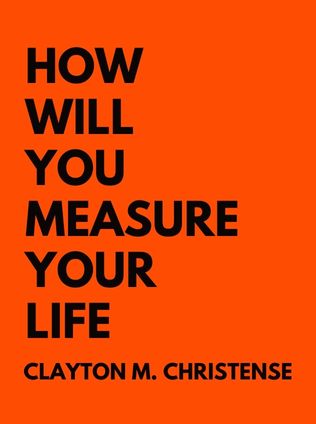
How Will You Measure Your Life
By Clayton M. Christensen,
Published 05/2012
About the Author
Clayton M. Christensen was a renowned professor at Harvard Business School and a pioneer in innovation and business management. He authored several influential books, including the bestselling "The Innovator's Dilemma." Christensen co-founded four companies, including the consulting firm Innosight. He was known for his work on disruptive innovation, which has significantly impacted how businesses operate and grow. His profound insights have guided countless professionals and organizations towards success.
James Allworth studied at the Australian National University and Harvard Business School, where he was named a Baker Scholar. He previously worked at Booz & Company and Apple. Allworth has contributed significantly to the field of business strategy and innovation.
Karen Dillon is the former editor of the Harvard Business Review. She graduated from Cornell University and Northwestern University's Medill School of Journalism. Dillon has a wealth of experience in business journalism and has co-authored several impactful works on management and leadership.
Main Idea
"How Will You Measure Your Life?" delves into the critical questions of personal and professional fulfillment. Christensen, Allworth, and Dillon explore how individuals can find true happiness and meaning in their careers and personal lives. They offer profound insights into how high achievers can avoid the pitfalls of career dissatisfaction and personal discontent. By drawing on lessons from successful businesses and their own experiences, the authors provide guidelines for achieving enduring happiness and success.
Table of Contents
- Finding Happiness in Your Career
- Finding Happiness in Your Relationships
- Staying Out of Jail
Finding Happiness in Your Career
What Makes Us Tick
Many of us start our careers with dreams and aspirations, but over time, we compromise and settle for less fulfilling jobs. Christensen argues that understanding what truly motivates us is crucial to finding happiness in our careers. He discusses two theories of motivation:
- Incentive Theory: This theory suggests that people work according to how they are compensated. However, it often fails to bring true job satisfaction.
- Motivation Theory: Proposed by Frederick Herzberg, this theory distinguishes between hygiene factors and motivation factors. Hygiene factors, such as job security and compensation, prevent dissatisfaction but do not create satisfaction. Motivation factors, like challenging work and personal growth, are what truly satisfy us.
"The opposite of job dissatisfaction isn't job satisfaction but rather an absence of job dissatisfaction." - Frederick Herzberg
To find a fulfilling career, one must balance hygiene factors and motivators. It's essential to seek jobs that not only meet basic needs but also provide intrinsic rewards.
The Balance of Calculation and Serendipity
Christensen emphasizes the importance of balancing deliberate strategies with emergent opportunities. While having clear career goals is important, being open to unexpected opportunities can lead to greater fulfillment. He advises young professionals to experiment, learn from their experiences, and adjust their strategies accordingly.
"Understanding that strategy is made up of these two disparate elements and that your circumstances dictate which approach is best will better enable you to sort through the choices that your career will constantly present." - Clayton M. Christensen
balancing deliberate and emergent strategies include:
Sign up for FREE and get access to 1,400+ books summaries.
You May Also Like
The Subtle Art of Not Giving a F*ck
A Counterintuitive Approach to Living a Good Life
By Mark MansonRich Dad Poor Dad
What the Rich Teach Their Kids About Money - That the Poor and Middle Class Do Not!
By Robert T. KiyosakiHow To Win Friends and Influence People
The All-Time Classic Manual Of People Skills
By Dale CarnegieQuiet: The Power of Introverts
The Power of Introverts in a World That Can't Stop Talking
By Susan Cain



















